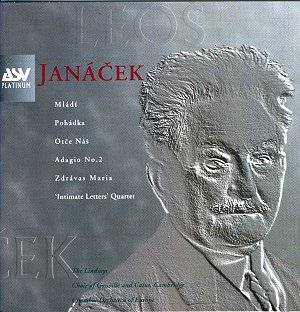ASV’s new budget Platinum
series offers some exceedingly good compilations. This Janáček
repackaged album is an excellent example; treasure-trove for the adventurous
music lover who will be rewarded with a programme of colourful and approachable
music in an appealing variety of forms.
The opening work is the
Second String Quartet composed in the last year of Janáček’s life.
Subtitled “Intimate Letters” it was inspired by the composer’s love
for Kamila Stösslova to whom he wrote with “obsessive regularity” as
Jan Smaczny writes. The music would seem to be evocative of passionate
correspondence indeed! Terse, angry, petulant outbursts, gentle lyricism
and ardent romanticism are all there. The Lindsays realise all these
emotions in a taut, polished performance.
Mládí (Youth) incorporates elements
of Moravian folk music and the composer’s studies of speech rhythms.
The work expresses an old man’s feelings of nostalgia for his carefree
days of youth. Intriguing rhythms and imaginative instrumental combinations
and registers, intrigue the ear and there is a sense of the comic bucolic
and the pastoral.
Pohádka (Fairy Story) is an enchanting
romantic work full of youthful charm and melody, for cello and piano.
It is something of a conversation piece with much use of alternate staccato
(or pizzicato in the case of the cello) and legato exchanges.
The Second Adagio for organ probably had its origins
in improvisation at the organ for the music is quite free and sounds
spontaneous.
The real find though is the beauty of Janáček’s
setting of The Lord’s Prayer. This lovely work is worth
the price of the CD alone. The opening Andante is feather-light
and rapt, the deep organ pedal and the rippling harp ostinato providing
a serene grounding for the multi-part male chorus arching overhead before
the entry of the tenor soloist strongly intoning "Our Father, which
art in heaven." The second movement, "Thy will be done",
features a long-breathed tenor melody and some gorgeous choral harmonics.
The brief third movement brings drama and a more impassioned plea "Give
us this day our daily bread" after a storm has wrecked the village’s
harvest. Humble devotions are given, "Forgive us our trespasses"
in the Adagio fourth movement that features the tenor soloist (unidentified).
The concluding movement "Lead us not into temptation" is another
realistic tableau of village life, like that of the third movement –
an exhausted mother leans over her little sleeping child unaware that
a murderous thief stands behind. The aggressive ostinato and the dramatic
end of the composition seems to reflect the imminent death of the hapless
mother. The compilation ends with Zdrávas Maria (Hail
Mary) for tenor, chorus and organ and solo violin that owes much to
Janáček’s transcribing and arranging
Czech folk melodies.
An inspired compilation
of lesser known Janáček’s works. All are colourful and approachable
and the beauty of the setting of The Lord’s Prayer is
deeply affecting. Thoroughly recommended.
Ian Lace

